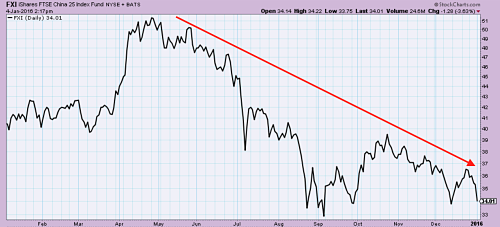We’ve seen this over and over, markets usually start to turn downward before bad market news hits the hardest.
In November, when China’s stock market rallied, we warned that the rally lacked strength and that further declines would follow. We didn’t have a crystal ball, we just analyzed what market participants were doing. China’s stock market experienced a sell-off back in April and to lift a falling market investors needed to buy shares. We didn’t see that sort of action in November and that was a sign that sellers were still in control and that markets were about to roll over. In that kind of environment, markets are ready to sell-off as soon as a bearish event happens.
Over the weekend, China’s stock market got its bearish news, the Caixin/Markit China Manufacturing PMI slipped to 48.2 in December from 48.6 in November, contracting for a 10th straight month. The news painted a more negative outlook than the data from China’s National Bureau of Statistics which read 49.7. China’s government measure of factory activity habitually looks better than how factories are actually performing.

China’s iShares China Large-Cap (N:FXI) ishares heading south. Source: MetalMiner analysis of @StockCharts.com data.
Investors reacted as they should. They sold. China’s stock markets fell sharply on Monday and trading on China’s Shanghai and Shenzhen stock exchanges was halted for the first time under new “circuit breaker” rules, which are designed to curb market volatility. Based on current market conditions, we expect the Chinese stock market to hit new lows soon.
Economic news on the home front wasn’t great, either .Economists had expected a slight rise to 49 in the the December ISM Manufacturing Index, but it instead slipped to 48.2, down from 48.6 in November and its lowest point since June 2009.
Interestingly, the US stock market had already already showed signs that trouble was ahead. US stock exchanges have been rolling over for quite some time and, on Monday, the selling intensified.
It’s All About the Commodities
We are witnessing, first hand ,what could be a very dark year for global stock markets, and I’m saying that because this time it really is all about commodities. China’s demand slowdown and a strong dollar have left the world with a commodity surplus and low prices — and this, of course, includes industrial metals.
The market has underestimated the demand erosion that China’s economic rebalancing has created. Metal producers are awaiting a comeback in demand to meet the overcapacity built up over the past few years. Falling prices are not only hurting metal producers but any commodity producer. Especially, the oil industry, which is suffering its biggest downturn since the ’90s.
This is not something new this year, but as prices get lower and lower markets are starting to acknowledge that this situation is not sustainable and that the global economic consequences will be bad. Not only in China, but the fear is also being felt in the US stock market. China’s government can make the unsustainable situation there look better than what it really is, but free markets… they don’t lie.
